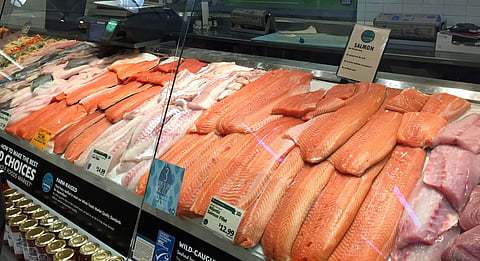

Fish counter with Norwegian salmon fillets in the U.S. The price of fresh salmon fillets was already at a record high in January 2025 before tariffs.
Photo: Trude Bessesen / Norwegian Seafood Council.
With the universal 10% tariff in effect since Saturday, the reciprocal tariffs ordered by the Trump Administration will go into effect tomorrow, and while reactions abroad have been pouring in, there are also reactions at home. Thus, in a reality where the food supply chain is global, U.S. restaurants and grocery stores have shown their concern.
Both sectors, which are closely related, fear that tariffs will increase food and packaging costs, driving prices up for consumers, who will feel the pressure on their household budgets. They will also add uncertainty to managing availability and, in addition, could lead to reduced competitiveness of U.S. companies against their international competitors.
However, both the U.S. National Restaurant Association and FMI - The Food Industry Association - representing a wide range of members across the food value chain -, said they are committed to continuing their collaboration with the White House to let it know firsthand the challenges these changes pose for restaurant operators, as well as consumer perceptions of tariffs and other issues impacting the economy and food prices.
From the U.S. National Restaurant Association, its President and CEO, Michelle Korsmo, warned that the application of reciprocal tariffs on the scale announced will generate changes and disruptions that restaurant operators will have to face to keep their business open.
"Restaurant operators know consumers are very sensitive to costs and have kept menu price increases to 30%, while their food costs have gone up 40% in the last five years," Korsmo stated.
The U.S. National Restaurant Association President and CEO remarked that restaurant operators depend on a steady supply of fresh ingredients year-round to deliver the dishes their customers want and expect.
"Many restaurant operators source as many domestic ingredients as they can, but it's simply not possible for U.S. farmers and ranchers to produce the volumes needed to support consumer demand," she said.
Regarding the next steps, the U.S. restaurant representative announced the association will offer its members economic research to support their decision-making, in addition to convening supply chain experts from across the industry to share efforts to achieve the best outcomes for restaurant consumers and the commercial viability of restaurants.
Nevertheless, Michelle Korsmo saved the most direct measure for last. "The National Restaurant Association will also continue to share with the White House the real-life challenges these changes present for restaurant operators and ask to have food and beverages exempted from these tariffs," she stated.
As in the case of restaurants, the U.S. food industry is also concerned about the consequences of reciprocal tariffs, although, in its case, it acknowledged that the Trump Administration has taken several measures that it described as positive given that they have reduced "unnecessary regulatory burdens" on the sector.
"We appreciate and support the Trump administration's desire to protect American jobs, boost our manufacturing sector and lower grocery prices – goals we are committed to working with President Trump to achieve," Leslie G. Sarasin, President and CEO of FMI - The Food Industry Association, also said in her statement.
However, Sarasin added that the uncertainty and inflationary pressures generated by reciprocal tariffs are a major concern for U.S. consumers and companies in the food industry, which operate on net margins of just 1.6% in retail and 7.5% in food manufacturing.
"Our customers are apprehensive," she acknowledged. According to FMI's March Grocery Shopper Snapshot survey, 54% of grocery shoppers cited increased tariffs on imported food as their biggest concern related to the price of groceries, a five-percentage point increase from January, when Trump took office.
It should be recalled that in the specific case of seafood, even before the U.S. tariffs came into play, U.S. consumers already considered seafood products to be expensive despite falling costs, according to the 'Power of Seafood 2025' report, presented in March at the Seafood Expo North America in Boston.
Although in her case she has not announced more concrete measures, like her counterpart at the U.S. National Restaurant Association, the President and CEO of FMI - The Food Industry Association, also reflected on the fact that, today, the food supply chain is not something that can be managed solely at the local level.
"Our food system is intricately linked with global markets − including products not grown in the United States like bananas or seasonal items − which helps keep prices down while providing American shoppers year-round access to safe, nutritious food," Leslie G. Sarasin recalled.
